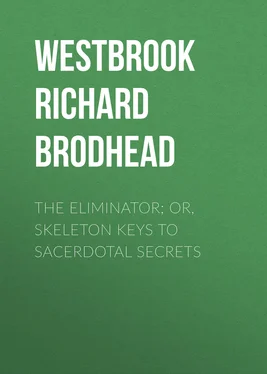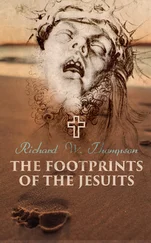Richard Westbrook - The Eliminator; or, Skeleton Keys to Sacerdotal Secrets
Здесь есть возможность читать онлайн «Richard Westbrook - The Eliminator; or, Skeleton Keys to Sacerdotal Secrets» — ознакомительный отрывок электронной книги совершенно бесплатно, а после прочтения отрывка купить полную версию. В некоторых случаях можно слушать аудио, скачать через торрент в формате fb2 и присутствует краткое содержание. Жанр: foreign_prose, foreign_religion, Философия, foreign_psychology, foreign_antique, на английском языке. Описание произведения, (предисловие) а так же отзывы посетителей доступны на портале библиотеки ЛибКат.
- Название:The Eliminator; or, Skeleton Keys to Sacerdotal Secrets
- Автор:
- Жанр:
- Год:неизвестен
- ISBN:нет данных
- Рейтинг книги:3 / 5. Голосов: 1
-
Избранное:Добавить в избранное
- Отзывы:
-
Ваша оценка:
- 60
- 1
- 2
- 3
- 4
- 5
The Eliminator; or, Skeleton Keys to Sacerdotal Secrets: краткое содержание, описание и аннотация
Предлагаем к чтению аннотацию, описание, краткое содержание или предисловие (зависит от того, что написал сам автор книги «The Eliminator; or, Skeleton Keys to Sacerdotal Secrets»). Если вы не нашли необходимую информацию о книге — напишите в комментариях, мы постараемся отыскать её.
The Eliminator; or, Skeleton Keys to Sacerdotal Secrets — читать онлайн ознакомительный отрывок
Ниже представлен текст книги, разбитый по страницам. Система сохранения места последней прочитанной страницы, позволяет с удобством читать онлайн бесплатно книгу «The Eliminator; or, Skeleton Keys to Sacerdotal Secrets», без необходимости каждый раз заново искать на чём Вы остановились. Поставьте закладку, и сможете в любой момент перейти на страницу, на которой закончили чтение.
Интервал:
Закладка:
Staniland Wake, an English writer, in his great work on the Evolution of Morality , vol. ii., page 59, thus expresses his views: “Judging from this fact, many persons imagine—or at least, from the superstitious reverence that they have for the Decalogue, appear to do so—that until the time of the Hebrew lawgiver the most ordinary rules of morality were unknown. The mere fact of Egypt being the starting-point of the Exodus ought to be sufficient to disabuse the mind of this idea, without reference to the contents of the code itself. But the moral laws given in the Decalogue are of so primitive a character that it is absurd to suppose, except on the assumption that the Hebrews were at that period in a condition of pure savagery, that God would personally appear to give his immediate sanction to them. The commands, Honor thy father and thy mother, Thou shalt not kill, Thou shalt not commit adultery, Thou shalt not steal, Thou shalt not bear false witness against thy neighbor, Thou shalt not covet, were simply reiterations of laws to which the Hebrews had been subject during their whole sojourn in Egypt, and which must, in fact, have been familiar to them before their ancestors left their traditional Chaldean home.”
Then we must bear in mind that Moses himself was an Egyptian by birth, and that he was brought up at the court of Pharaoh until he was forty years of age, and in Acts 7: 22 we are told that “Moses was learned in all the wisdom of the Egyptians, and was mighty in words and in deeds.”
The whole matter relating to the Pentateuch is thus summed up by the late Prof. John Wm. Draper, M. D., LL.D., late of the University of New York, in his Conflict between Religion and Science : “No man may dare to impute them (the books of the Pentateuch) to the inspiration of Almighty God, their inconsistencies, incongruities, and impossibilities, as exposed by many learned and pious modern scholars, both German and English, are so great. It is the decision of these critics that Genesis is a narrative based upon legends; that Exodus is not historically true; that the whole Pentateuch is unhistoric and un-Mosaic : it contains the most extraordinary contradictions and impossibilities, sufficient to involve the credibility of the whole—imperfections so conspicuous that they would destroy the authenticity of any modern historical work.”… “To the critical eye they all present peculiarities which demonstrate that they were written on the banks of the Euphrates, and not in the desert of Arabia. They contain many Chaldaisms.”… “From such Assyrian sources the legends of the creation of the earth and heavens, the Garden of Eden, the making of man from clay and the woman from one of his ribs, the temptation of the serpent, etc.,… were obtained by Ezra.” “I agree in the opinion of Hupfeld, that the discovery that the Pentateuch is put together out of the various sources of original documents is beyond all doubt, is not only one of the most important and most pregnant with consequences for the interpretation of the historical books of the Old Testament—or rather for the whole of theology and history—but it is also one of the most certain discoveries which have been made in the domain of criticism and the history of literature.”
But not only do the laws of Egypt antedate the laws accredited to Moses, but the Hindoos had laws which were yet more ancient. The writings of Buddha, who died in 477 b. c., refer to older books and quote from them, and these again refer to still older books, until we reach laws which existed many thousands of years before the Law of Moses, as the laws of Manu were drawn from the “immemorial customs” of the nation and constitute a kind of common law . “The most accurate scholars point to India as the origin of Egyptian civilization,” says Le Renouf, the learned Egyptologist.
If Egyptian literature was derived in a remote period from India, what must be the date of old India’s laws as compared with the laws of the Hebrews? It is no wonder that Max Müller, professor in the orthodox University of Oxford, says (in Chips, vol. i., p. 11): “After carefully examining every possible objection that can be made against the date of the Vedic hymns, their claim to that high antiquity which is ascribed to them has not, as far as I can judge, been shaken.” The same learned Sanskrit scholar says, “The opinion that the pagan religions were mere corruptions of the religion of the Old Testament, once supported by men of high authority and great learning, is now as completely surrendered as the attempt at explaining Greek and Latin as corruptions of Hebrew” ( Science of Religion , p. 24). This great Sanskrit scholar admits in many places in his voluminous writings the greater antiquity of the pagan scriptures, and gives many weighty reasons to show how impossible and absurd it is to suppose that they have been changed and interpolated to adapt them to more modern times.
The Vedas, the sacred writings of the Hindoos, according to Sir William Jones the Orientalist, “cannot be denied to have an antiquity the most distant.” According to the Brahmans, they are coeval with the creation, and the Sama-Veda says, “They were formed of the soul of Him who exists by, or of, himself.” The Hindoo laws were codified by Manu and copied by all antiquity, notably by Rome in the compilation or digest of the laws of all nations called the Code of Justinian , which has been adopted as the foundation of all modern legislation. I could, did time permit, furnish the laws of Manu, the Justinian Code, and the Civil Code of Napoleon in parallel columns, in a way to show their common origin beyond a doubt. Laws of betrothal and marriage, paternal authority, tutelage, and adoption; property, contract, deposit, loan, sale, partnership, donation, and testamentary bequest,—all were elaborately promulgated by the Code of Manu in 2680 slocas .
Laws were arranged under eighteen principal heads, concerning as many different causes for which laws are enacted: Debts, deposits and loans for use, sale without ownership, gifts, non-payment of wages, agreements, sale and purchase, disputes, boundaries, assaults, slander, robbery and violence, adultery, altercation between man and wife, inheritance, and gaming. “The court of Brahma with four faces” is where four learned Brahmans sat in judgment, one of whom was the king’s chief counsellor.
One of their trite sayings was, “When justice, having been wounded by iniquity, approaches the court, and the judges extract not the arrow or dart, they also shall be wounded by it.”
Конец ознакомительного фрагмента.
Текст предоставлен ООО «ЛитРес».
Прочитайте эту книгу целиком, купив полную легальную версию на ЛитРес.
Безопасно оплатить книгу можно банковской картой Visa, MasterCard, Maestro, со счета мобильного телефона, с платежного терминала, в салоне МТС или Связной, через PayPal, WebMoney, Яндекс.Деньги, QIWI Кошелек, бонусными картами или другим удобным Вам способом.
Интервал:
Закладка:
Похожие книги на «The Eliminator; or, Skeleton Keys to Sacerdotal Secrets»
Представляем Вашему вниманию похожие книги на «The Eliminator; or, Skeleton Keys to Sacerdotal Secrets» списком для выбора. Мы отобрали схожую по названию и смыслу литературу в надежде предоставить читателям больше вариантов отыскать новые, интересные, ещё непрочитанные произведения.
Обсуждение, отзывы о книге «The Eliminator; or, Skeleton Keys to Sacerdotal Secrets» и просто собственные мнения читателей. Оставьте ваши комментарии, напишите, что Вы думаете о произведении, его смысле или главных героях. Укажите что конкретно понравилось, а что нет, и почему Вы так считаете.












